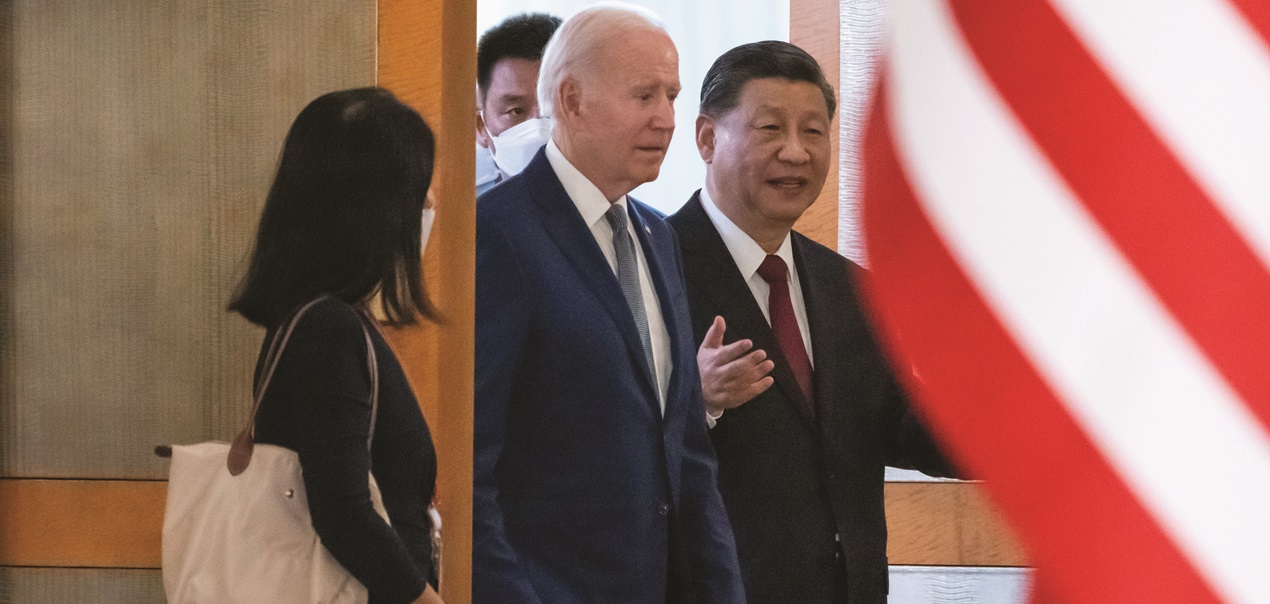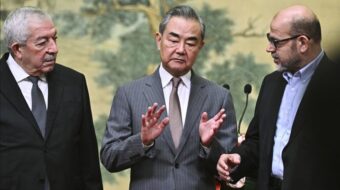
Presidents Joe Biden and Xi Jinping are meeting near San Francisco Wednesday, a get-together at which Biden claims he hopes to “stabilize” relations with China. He doesn’t mention, of course, that those relations have been made unstable by continued U.S. attacks on and propaganda against China’s economic and political interests.
The Biden administration has consistently tried to dictate to China that it end its friendly relations with Russia and numerous other countries, and it has levied all kinds of sanctions against countries that China deals with and against China itself.
Biden continues to hypocritically express concern about human rights in China even as his administration funds and fuels Israeli-propagated genocide in Gaza.
The two leaders, who are meeting on the sidelines of the Asia-Pacific Cooperation Forum summit, reportedly haven’t even spoken to one another in over a year. The U.S. hasn’t been silent during that period when it comes to China, though, having used every excuse to mount major propaganda campaigns against the Asian nation.
The two countries, for example, have long surveyed the military and other activities of one another, but the U.S. blew into major proportions the issue of a harmless balloon that had wandered off course over U.S. territory.
The U.S. flies armed airplanes over and near Chinese waters and has, on occasion, almost collided into Chinese planes over the South China Sea.
Also, during the year that the two leaders have not spoken, the U.S. has, without any proof, campaigned against what it says are Chinese intentions to “take over” Taiwan, an island off the coast of China that actually does belong to China—a reality even the U.S. recognizes.
Biden has used as justification for his war against Russia in Ukraine the excuse that “winning” in Ukraine is an essential first step in halting Chinese aggression against Taiwan. There has been, needless to say, no such aggression against Taiwan by China.
At the San Francisco meeting, according to the White House PR people, Biden is seeking to show the world that while the U.S. and China are economic competitors, they are not locked in a major battle for supremacy with global implications.
That flies in the face of reality, though, since his administration and hosts of top U.S. lawmakers constantly identify China as the “main security threat” facing the U.S.
Nothing could be further from the truth. The main security threat facing the U.S. is the threat of fascism and right-wing domestic terror coming from within our own borders.
China, unlike the U.S., is not involved in any military conflict anywhere in the world. It is the U.S., not China, that has 800 military bases scattered all around the world. A good chunk of these U.S. bases encircle China, and U.S. nuclear subs constantly patrol waters off China’s east coast. The Chinese have no such equivalent, so the reasonable question to ask is: “Who is a security threat to whom?”
The U.S., determined to be the world’s top gun, has also sought to control what nations China deals with around the world. The U.S. has tried to force China to end its neutrality in the Ukraine-Russia War, and it has condemned Chinese attempts to offer a peace plan to end that war. There, too, the U.S. backed what has now proven to be the blowing up of the Nordstream Pipeline by Ukraine. Imagine how the U.S. would react if China did anything like this.
The Biden administration also sees China, a big buyer of Iranian oil, as having considerable leverage with Tehran, and despite the economic relations between those two countries, it tries to get China to cut all ties with Iran and join its campaign against that country.
Again, imagine how the U.S. would react if China patrolled U.S. waters with nuclear missile submarines, flew its warplanes over Long Island or San Francisco Bay, and told the U.S. to stop backing the countries responsible for genocide in Gaza and the blowing up of international energy infrastructure.
Even as Biden claims he wants improved relations, White House National Security Council spokesman John Kirby said Biden was “not going to be afraid to confront where confrontation is needed on issues where we don’t see eye to eye.”
Xi is justifiably looking for assurances from Biden that the U.S. will not support Taiwan independence, start a new Cold War, or suppress China’s economic growth.
In the hours before the meeting, White House officials said Biden was coming into the talks bolstered by signs the U.S. economy is in a stronger position than China’s and that the U.S. is building stronger alliances throughout the Pacific.
The U.S. president, speaking at a campaign fundraiser on Tuesday evening, pointed to his upcoming meeting as an example of how “re-established American leadership in the world is taking hold.” As for China, the president told donors, it has “real problems.”
He was referring to the International Monetary Fund’s recently reduced growth forecasts for China. The IMF predicted economic expansion of 5% this year and 4.2% in 2024 for China, down slightly from previous forecasts. There are of course differences in scale, but it’s worth noting that the pace of predicted growth is still greater for China than that of the United States, where it is predicted that growth for the same period will be at 3.2%.
Foreign companies operating in China say tensions with Washington over technology, trade, and other issues are causing some to reassess their plans for investing in the Chinese market. This, of course, has been the goal of many of the U.S. propaganda attacks on China: Make investors nervous about political tensions and get them to put their money somewhere else..
The unfortunate thing about the Biden administration’s approach to China is that it sidetracks or prevents what should be the cooperation of both countries to meet perhaps the biggest challenge facing the world: the struggle to reset environmental policies in order to save the planet.
At home in the U.S., Biden has to do battle with powerful fossil fuel capitalist interests to realize any of his environmental goals. In China, he could have a great friend with whom to cooperate on these matters.
As with all opinion and news-analytical articles published by People’s World, this article reflects the opinions of its author.
We hope you appreciated this article. At People’s World, we believe news and information should be free and accessible to all, but we need your help. Our journalism is free of corporate influence and paywalls because we are totally reader-supported. Only you, our readers and supporters, make this possible. If you enjoy reading People’s World and the stories we bring you, please support our work by donating or becoming a monthly sustainer today. Thank you!












Comments